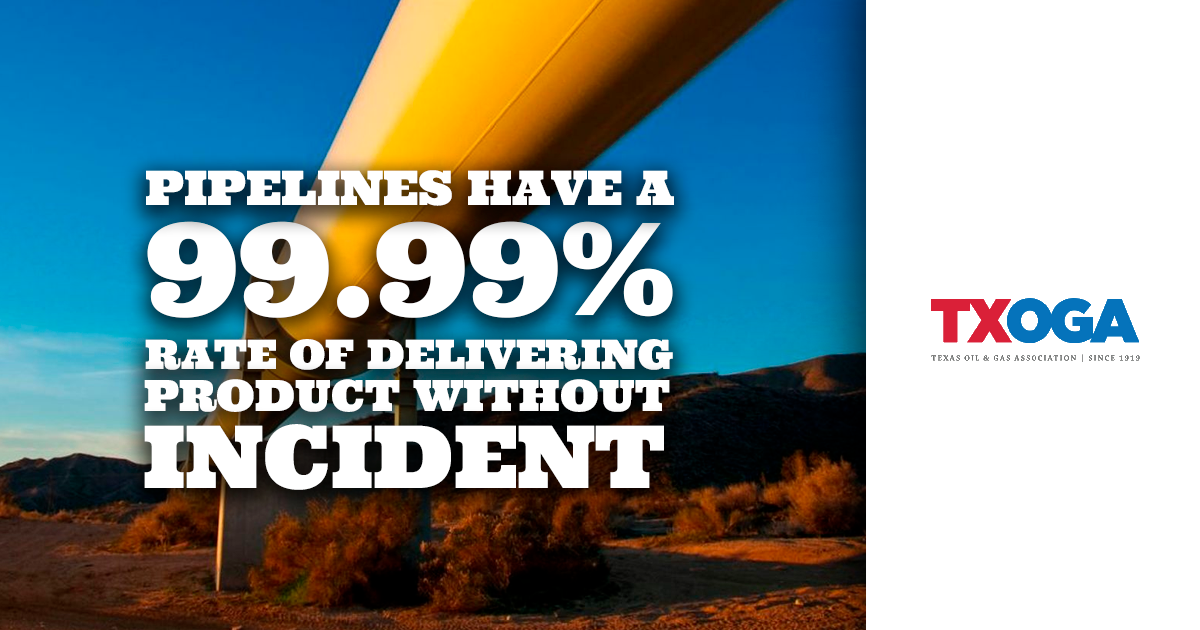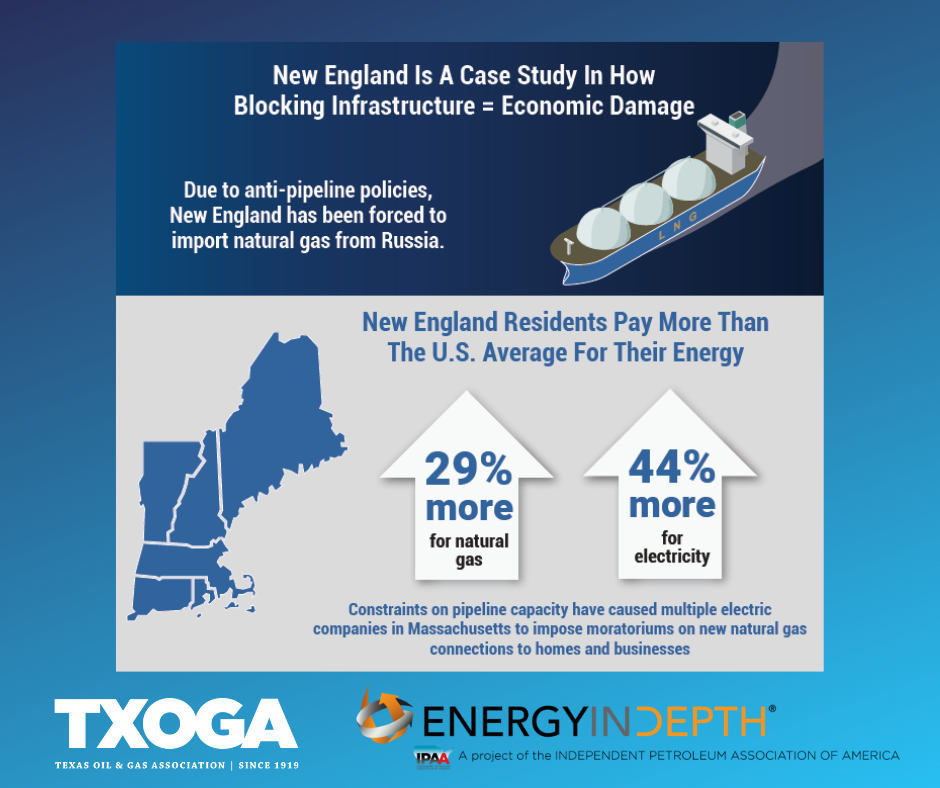Our Industry
Essential Infrastructure
Technology has unlocked our country’s vast reserves of natural gas and infrastructure, like pipelines, allow communities across Texas and the U.S. have access to it. This means cleaner air, more jobs and economic growth, bolstered security and energy independence.
The increase in production of oil and natural gas has allowed the U.S. to expand and improve infrastructure across the nation. Building this network has brought jobs, security, and innovations in technology to the U.S. for the economy’s benefit.
Pipelines are the main method of transportation for natural gas and fuel in Texas. They are also the safest method of transportation, delivering product without incident over 99.99% of the time. Pipelines help provide affordable and reliable energy to millions of families across the state and the nation, and pipeline maintenance, repair, and buildout supports hundreds of thousands of jobs in Texas and millions across the U.S. Pipelines also work to protect our environment and health by reducing pollution associated with other methods of fuel transportation.
Expanding energy infrastructure, including pipelines, tanks and terminals, is the best way to increase energy reliability and security and to protect our fuel supply in the event of a natural disaster.
TXOGA’s Landowner Handbook: Pipelines 101 details private property rights, how the pipeline industry is protecting and improving communities, and provides insight on pipeline regulation and oversight.
Also included is the Landowner’s Bill of Rights from the Office of the Attorney General, a glossary of terms, and a frequently asked questions (FAQ) section, along with additional resources. In this effort, we hope to better equip landowners with the ability to have candid conversations about the eminent domain process.
Quick facts:
- Between 2014-2024, the Texas pipeline industry is expected to contribute $374 billion in total economic output.
- It is estimated that between 2015 and 2035, almost 2 million infrastructure-related jobs will be created.
- Pipelines are responsible for an estimated 171,000 jobs in Texas.
- Pipelines safely deliver oil and gas without incident over 99.999% of the time.
- Texas’ 488,564 miles of pipelines are monitored 24 hours a day, 7 days a week.
- By developing Texas’ abundant supply of oil and natural gas, we significantly decrease our reliance on foreign sources of energy. Blocking pipeline projects would force Texas to rely on other nations for energy.
- New pipeline infrastructure improves our air quality and safety by ensuring fewer trucks are on roads and highway.
- Building new pipeline projects will allow the oil boom in Texas to continue, expanding jobs and revenue for schools.

Pipelines are responsible for an estimated 171,000 jobs in Texas.
[TWEET THIS FACT]
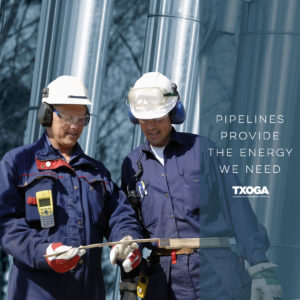
By developing Texas’ abundant supply for oil and natural gas, we significantly decrease our reliance on foreign sources of energy. Blocking pipeline projects would force Texas to rely on other nations for energy.
[TWEET THIS FACT]
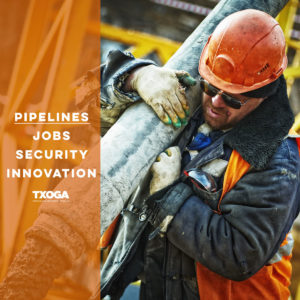
Texas’ 479,798 miles of #pipelines are monitored 24 hours a day, 7 days a week. [TWEET THIS FACT]
Investments in energy infrastructure create well-paying jobs, give domestic manufacturers a competitive advantage through lower energy and raw material costs, and provide revenue to local, state and federal governments.
“Pipelines are the safest and most environmentally-friendly mode of energy transportation. Expanded pipeline infrastructure will reduce flaring, improve road safety and strengthen the Texas economy by providing hundreds of thousands of good jobs and billions of dollars in state and local tax revenues. Demand for Texas’ abundant and affordable supply of clean natural gas necessitates modernized infrastructure regulations so that Texas can continue to provide domestic energy security and global stability and make the air cleaner at home and around the world.”
Todd Staples
TXOGA president
Flaring
Flaring is required to maintain safe, environmentally sound operations in areas where more pipeline infrastructure is needed in order to get abundant clean-burning natural gas to refineries and ultimately consumers. As pipeline infrastructure comes online, the need to flare will decrease as operators are able to capture and transport this valuable product. Stopping a pipeline will only stop one of the most environmentally friendly and safest ways to transport the clean, reliable fuel families need to power their homes, businesses, and lives.
Oil production in the Permian Basin alone accounts for roughly one third of the nation’s total production, so pipeline capacity is critical to ensuring this energy reaches consumers in Texas, around the country and across the globe.
Investing in our nation’s energy infrastructure will not only allow the oil and natural gas industry to keep pace with energy demand, it will also help keep energy affordable for Americans.
Improving our energy infrastructure is essential to delivering the economic, security, and environmental benefits of U.S. energy leadership to communities across the country and around the world.
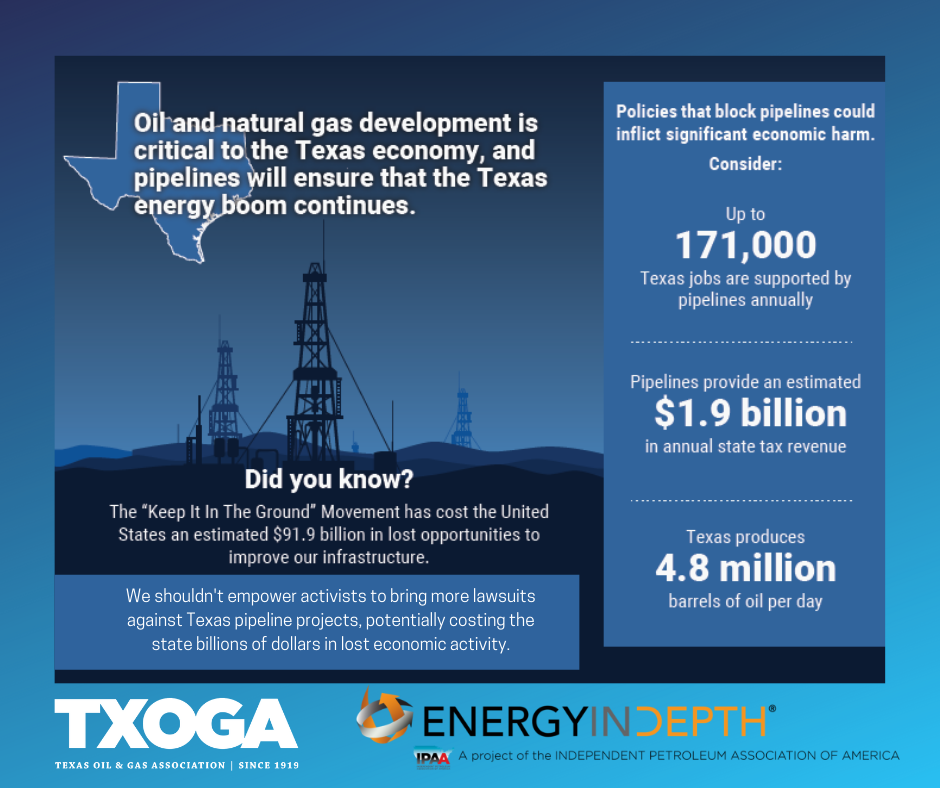
While consumer expenditures on healthcare, education, and food have risen sharply in recent years, energy-related spending has notched unprecedented declines.
As we’ve seen in New England, policies that discourage and delay pipeline construction drastically increase the cost of heating and cooling our homes.


